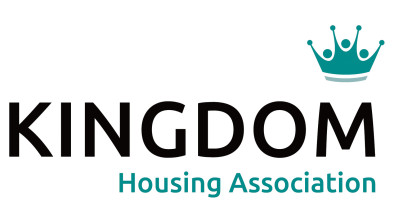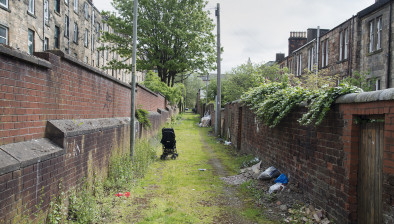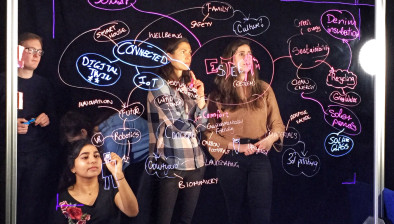Putting housing services online risks widening inequalities, research finds

Professor Gina Netto
The rapid digitisation of social housing services in the UK is deepening inequalities for minoritised ethnic communities, a three-year research project has found.
Without careful design, online social housing services risk excluding those who are already facing digital exclusion, language barriers and systemic discrimination, according to the Protecting Minority Ethnic Communities Online (PRIME) study, which today publishes a series of policy briefs (including one for social housing), a Code of Practice and videos in multiple languages alongside a suite of free-to-use technological tools.
The tools include the IRESHA app: specifically designed for use by social housing providers and applicants.
Led by Professor Gina Netto of Heriot-Watt University, the interdisciplinary research team examined the impact of digitalisation on social housing, healthcare and energy services across the UK.
Conducted in four locations - Bradford, Manchester, Glasgow and the London Borough of Tower Hamlets - the study highlights the particular issues that minoritised ethnic communities face when essential services move largely online.
Researchers found that poorly designed digital platforms, combined with a lack of support and inadequate regulatory oversight, could further marginalise vulnerable groups.
“While digital technology has enormous potential, it can also entrench existing inequalities,” said Professor Netto, Professor in International Migration and Racial Justice, at Heriot-Watt University’s School of Energy, Geoscience, Infrastructure and Society.
“For those with limited English proficiency, digital literacy or access to adequate digital devices and internet connectivity, the barriers to navigating online systems can be insurmountable.”
Housing sector: key findings
Compared to the healthcare and energy sectors, the social housing sector has been slower to digitalise and remains plagued by structural factors. While social landlords often collect ethnicity data, its use in monitoring equitable access to digital services is minimal, making it difficult to assess the impact of online housing platforms
According to the PRIME Housing Policy Briefing, researchers found that the need to improve efficiency and reduce costs is a key driver for the digitalisation of social housing services. The quality and inclusivity of these services vary, highlighting the need for fairer digital systems.
Currently, service providers’ awareness of the use of digital services by minoritised ethnic communities is low. A better understanding of how these groups engage with digital services is needed for fair access and outcomes.
Many individuals from minoritised ethnic communities face challenges due to digital poverty, limited English, and limited digital skills. These factors often overlap and complicate access. More effort is needed to improve access and offer alternative communication for those who can’t engage with these services.
Community engagement among social landlords varies, with some offering good practice like language support. Engaging diverse communities is crucial to filling support gaps and ensuring inclusive digital services through co-design.
A better way is also required to collect, use, and publish ethnicity data respectfully and regularly to build trust with minoritised ethnic communities. Tracking how different ethnic groups use digital and traditional services will help social landlords show they are providing fair services and meeting equality duties.
Regulation helps keep race equality a priority in digital and other social housing services. A housing strategy which prioritises equitable outcomes and evaluation would address existing inequalities and prevent them from widening in the social housing sector, as digital services continue to be rolled out.
In response, the PRIME team has developed a Code of Practice for service designers, urging them to embed racial and linguistic inclusivity into their platforms. It has also published a series of policy briefs directed at the health, housing and energy sectors, as well as a technology policy brief. New, multi-lingual videos will help to raise awareness among minoritised ethnic communities and the organisations which work with them about potential online harms and the actions that they can take to create safer online spaces.
The team has also created a suite of free-to-use technology tools, to counter discriminatory processes in digital services. Professor Lynne Baillie, Professor of Computer Science, in Heriot-Watt University’s School of Mathematical & Computer Sciences who led the technological aspect of the project, emphasised the importance of proactive solutions: “We need digital tools that don’t just work for the most privileged, but for everyone. Our suite of privacy-enhancing tools provides practical solutions for more equitable digitalisation.”
Privacy Enhancing Technologies (PETs) help reduce online harms while preserving service utility, such as enabling aggregated data collection. The research team developed IRESHA, a Sharecode app as a proof-of-concept PET for the social housing sector. IRESHA minimises the personal data needed to assess eligibility for social housing by linking immigration documents (e.g., e-visas) to generate a sharecode. This allows housing providers to verify eligibility without revealing visa or immigration status, reducing bias and discrimination while ensuring applicants meet requirements.
The PersonaCreator app, also created by the research team, uses machine learning techniques on survey data to create personas of people from minority ethnic communities. These personas depict how people from these communities feel or experience various online harms, discrimination and bias while using digital services related to health, energy and social housing.
The PRIME team trained their machine learning algorithms on the PRIME survey and a survey from the UK Centre on the Dynamics of Ethnicity. Any survey anywhere in the world that collects similar, tabular data regarding ethnicity can potentially be used by researchers and organisations to populate the PersonaCreator app, revealing issues around digital services for minoritised ethnic communities in their location.
As the UK and devolved governments push forward with digital transformation, researchers and community advocates are calling for urgent policy changes. Without robust regulation and inclusive design, the benefits of digital public services will remain out of reach for many.
Professor Netto said: “The shift online must not leave people behind. We need a fundamental change which puts digital inclusion at the heart of service design and actively uses digital services to address existing inequalities.”
The full findings and policy recommendations from the PRIME project, together with all the free-to-use technological tools developed by the team are available here.









